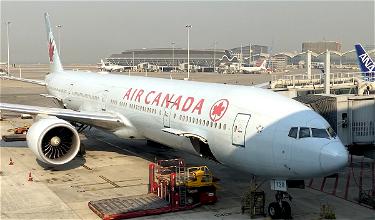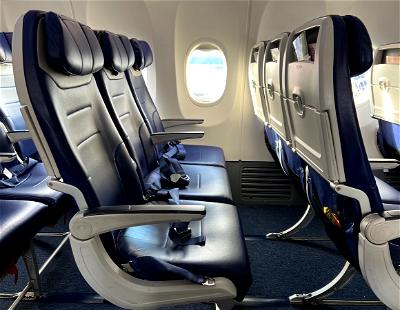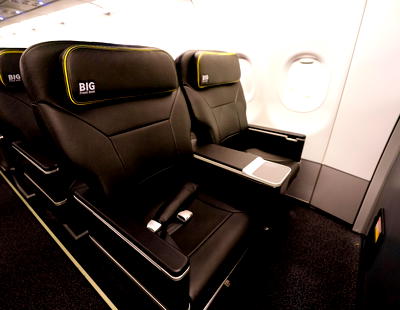The million (or perhaps multi-billion) dollar question is how travel restrictions can be eased without greatly increasing risk.
We’ve seen a countless number of airlines call for border restrictions to be relaxed and for there to be more robust testing, but we haven’t actually seen that much data as to what impact this would have. This will soon be changing.
In this post:
Voluntary COVID-19 international travel study
Canada currently has a mandatory 14-day quarantine for all arriving international travelers. This applies regardless of what country travelers are coming from.
It goes without saying that major airlines (and in particular Air Canada) are hoping for this to be relaxed a bit, given the extent to which it’s a deterrent for international travel.
McMaster HealthLabs, Air Canada, and Greater Toronto Airports Authority have teamed up to conduct a voluntary COVID-19 study of arriving international travelers.
Essentially the goal of this study is to determine the effectiveness of a mandatory 14-day quarantine compared to a rigorous coronavirus testing program.
Here’s how this voluntary study works:
- It began September 3, 2020, and lasts for a month
- International travelers arriving at Toronto-Pearson Terminal 1 will be invited to take part in the study, on a voluntary and confidential basis
- Participants will have a PCR test performed at the airport, and they’ll receive results electronically within 48 hours
- Travelers will be provided with two additional samples, to be self-collected seven and 14 days after arrival (during quarantine), coinciding with the government’s quarantine period
- The results will be published in a peer reviewed journal, in hopes that they can be used to shape any future quarantine policies
Do travel quarantines work?
Essentially this study is intended to determine just how much of a difference a 14-day quarantine makes, especially in comparison to testing.
No matter what aspect of the economy we’re talking about, there’s some risk-benefit analysis that needs to be done. For example, even in places where coronavirus is under control, there are risks to opening indoor dining, opening gyms, opening to visitors, etc.
The question is, just how much of a difference do precautions make? We’re seen many speculate on that, and we’ve also seen many travel brands suggest alternatives, though they largely haven’t been science based.
This study of inbound Canadian international travelers makes a lot of sense. The 14-day quarantine still applies, but they can determine:
- How many people actually have coronavirus upon entering the country?
- For those that don’t have coronavirus, how many have it at the seven and 14 day mark?
- If not a lot of people develop coronavirus with the second or third test, then presumably the conclusion would be that testing upon arrival would be a reasonable precaution to take to skip the 14-day quarantine
Can the results of this experiment be relied on, though? I have a couple of primary concerns:
- Since people are voluntarily participating, would high or low risk travelers be more likely to take part in this?
- What this doesn’t really consider is how many people would otherwise break their self-quarantine, since it’s not that tightly regulated; this actually seems like an advantage for mandatory testing on arrival over quarantining, and it’s something that this study won’t determine
Bottom line
The travel industry is talking a lot about how quarantines should be eliminated in favor of testing, which would allow people to travel more freely.
Unfortunately it has mostly been talk up until this point. There’s not much data as to how much risk that would add vs. a 14-day quarantine. And I don’t know about Canada, but at least in the US we still don’t have any major airports that offer travelers readily available testing, so…
What are you expecting the findings of this study to reveal?





As some have mentioned, the perspective on Canada’s quarantine enforcement may depend on timing of it - we are currently quarantining for a week now, and any of us 3 are yet to receive a phone call. Anecdotally I know quite a few people at work who have returned from international travel recently and are quarantining, so that may have to do with it.
As many have mentioned, Canada's quarantine enforcement is far from lax. In fact, domestic travellers to some provinces also have to quarantine, and from reports of friends and family who have gone to those places, the enforcement was steady and consistent (calls, texts, visits). Even arriving domestic university students are quarantined for 14 days AND have to take and clear 3 Covid-19 tests before being allowed on campus. It is absolutely a barrier to travel...
As many have mentioned, Canada's quarantine enforcement is far from lax. In fact, domestic travellers to some provinces also have to quarantine, and from reports of friends and family who have gone to those places, the enforcement was steady and consistent (calls, texts, visits). Even arriving domestic university students are quarantined for 14 days AND have to take and clear 3 Covid-19 tests before being allowed on campus. It is absolutely a barrier to travel (I haven't gone to visit my Mom because of the domestic quarantine requirement) so I appreciate the attempt to be science-led (McMaster is a well respected research university) rather than just stomping feet for the quarantine to be lifted from a purely financial standpoint.
We returned from Lisbon March 23 and there was nothing but chaos at Pearson with no social distancing, no screening, no temp checks, just a little piece of paper suggesting we might want to self isolate. Nobody asked where we came from or where we were going.
The arrival and overnight in Toronto was the most scary part of our travels (which had started in January in Asia) with no observance of any form of...
We returned from Lisbon March 23 and there was nothing but chaos at Pearson with no social distancing, no screening, no temp checks, just a little piece of paper suggesting we might want to self isolate. Nobody asked where we came from or where we were going.
The arrival and overnight in Toronto was the most scary part of our travels (which had started in January in Asia) with no observance of any form of social distancing. We had to continue onward to Kelowna before we could self isolate for the mandatory 14 days.
Our experience was that if we had contacted Covid, it would have been on arrival in Toronto. Testing at that point would show nothing and if we had become infected it would only show 7-14 days later. So I still am a strong fan of self isolation because of the problems with contact entering or leaving the airport.
Hopefully the study will have some reproducible results that can be used. One has to ask the question, why have they not been studying this problem since March 23? We threw Billions into a Chinese joint venture for vaccine that went nowhere. We could have used those funds for something of value. I guess there's no drama in a simple scientific study and no actors on the stage.
I suppose it really depends on what kind of profile you have to the authorities. I have *twice* had to quarantine after coming back from Europe. The first time was after I had to abort a business trip when Hungary closed its borders circa March 16 or 17. The second time is when I had to go on urgent family business to Greece. I came back on August 24 and am *currently* quarantining (in Quebec)...
I suppose it really depends on what kind of profile you have to the authorities. I have *twice* had to quarantine after coming back from Europe. The first time was after I had to abort a business trip when Hungary closed its borders circa March 16 or 17. The second time is when I had to go on urgent family business to Greece. I came back on August 24 and am *currently* quarantining (in Quebec) and this ends in 2 days time. On the flight recently completed I gave them my home address, my email and phone numbers etc on the form that I completed on the aircraft. In neither period of quarantine have I *ever* been contacted via email or phone or visit. Nothing. If you look at this article from July on the CBC website approximately 1% of border arrivals are flagged.
https://www.cbc.ca/news/politics/quarantine-act-police-1.5644838
@Pete They do it in California too. But dont worry if you fly to a red state they dont even check, which makes sense since you cant really come from a worse off area.
The covid stasi dropping in to check you at your home. And people are applauding that. Amazing. I wonder if the reaction would be the same if Trump had proposed such idiocy instead of the child king of Northern wokedom.
That none of this BS even matters. Quarantine don't work. Masks don't work. Testing don't work. Only herd mentality is gonna work. Just look at Sweeden.
Some countries have *both* quarantine AND testing requirements. It works like below and I wonder what kind of data came out of these countries...
Everyone gets two week quarantine, and are tested two or three times (upon arrival/before release, and sometimes at around fifth day of quarantine). All two or three tests need to be negative to be released from quarantine.
It's not lax at all. If you don't have a viable self-quarantine plan, the Government will take you to a quarantine facility. You'll spend 14 days in a hotel room and not be permitted to leave. Three meals a day are dropped outside your room (along with cleaning supplies), and once a day they do a health check.
A friend arrived back in Toronto and planned to self-quarantine with her elderly mother (sharing a kitchen...
It's not lax at all. If you don't have a viable self-quarantine plan, the Government will take you to a quarantine facility. You'll spend 14 days in a hotel room and not be permitted to leave. Three meals a day are dropped outside your room (along with cleaning supplies), and once a day they do a health check.
A friend arrived back in Toronto and planned to self-quarantine with her elderly mother (sharing a kitchen and bathroom). That didn't pass muster and she spent 14 days in this facility instead.
My parents also returned from the States. Two calls and one drop-in visit from Public Health to ensure that they were home.
Canada's approach hasn't been lax at all, which is likely why the country is in much better shape than the United States.
Meanwhile in Australia - we are still treated like convicts . I prefer the Canadian system.
The European Commission announced today that countries should use testing instead of quarantine for European travelers from high-risk countries traveling to lower-risk countries in the European Union. This strikes me as sensible.
So, hopefully some data to go with that of Germany, Iceland, HK and others.
Risks that will be hard to mitigate:
i) How to protect against and take into account people infected after arrival? (it happens!),
ii) How to overcome self-selection biases?
iii) How to ensure all tests are conducted to same standard (on arrival and at Day 7 and 14)?
Interesting nonetheless.
Would testing at arrival, day 5...
So, hopefully some data to go with that of Germany, Iceland, HK and others.
Risks that will be hard to mitigate:
i) How to protect against and take into account people infected after arrival? (it happens!),
ii) How to overcome self-selection biases?
iii) How to ensure all tests are conducted to same standard (on arrival and at Day 7 and 14)?
Interesting nonetheless.
Would testing at arrival, day 5 and 10, with the incentive of 3 negatives and you 'release' 4 days early be a better way to go to increase take-up and give richer data?
@janyyc
80% of arrivals into Canada are exempt as "essential". This was in a CBC article.
Essential doesnt mean what you think it does. All you need is a letter from your boss saying your trip was essential for the business. And boom, exempt!
So anything to back up the claim that quarantine is not enforced in Canada? The comments here seem to say otherwise. Where did you get your info? Grindr conversations?
A study to be published in a peer reviewed journal. That certainly won't be used by the current US administration to determine policy. We here use the guy who was on Tucker Carlson show who heard it from a guy who read something on the internet that was reviewed by Jared method.
Makes so much sense to try to be scientific about this. Quarantines were imposed because they’ve been around and have generally been fairly effective since at least the middle ages and the effectiveness of other options to prevent infection with a novel coronavirus were unknowable. A little scientific rigor will go a long way towards figuring out if it’s the right approach, not only for Covid19 but also for other new diseases, if we ever...
Makes so much sense to try to be scientific about this. Quarantines were imposed because they’ve been around and have generally been fairly effective since at least the middle ages and the effectiveness of other options to prevent infection with a novel coronavirus were unknowable. A little scientific rigor will go a long way towards figuring out if it’s the right approach, not only for Covid19 but also for other new diseases, if we ever expect to get past medieval practices. About time.
Canada has actually been strictly enforcing the mandatory quarantine rules. They pretty much can place a random call at random hours to check if you are at home and all people crossing into our border were warned of the severe consequences of breaking the quarantine (6 months jail + $750k fine maximum, or 1 year jail + $1M fine maximum if you ended up infecting others or killing someone with COVID). Of course, they have...
Canada has actually been strictly enforcing the mandatory quarantine rules. They pretty much can place a random call at random hours to check if you are at home and all people crossing into our border were warned of the severe consequences of breaking the quarantine (6 months jail + $750k fine maximum, or 1 year jail + $1M fine maximum if you ended up infecting others or killing someone with COVID). Of course, they have only been fining $1,000 so far for offenders but the maximum penalty is still a good deterrent for most people....
Canada is not the US....I know numerous travelers who have had their quarantine status checked by police and CBSA. This program is designed by the greedy Air Canada CEO and co. It just wants to open our borders to the diseased hordes to bolster their bottom lines...
Yes, I can confirm first-hand that the quarantine is definitely not lax. THAT BEING SAID, based on the current statistics there are ~120K people in quarantine at any given point (60K arrivals/week according to CBSA, can maybe subtract 10% for "essential") so yes, maybe quarantine isn't being as actively enforced as it was early on (when I was subject to it). All THAT being said, I am definitely in favour of a more balanced and...
Yes, I can confirm first-hand that the quarantine is definitely not lax. THAT BEING SAID, based on the current statistics there are ~120K people in quarantine at any given point (60K arrivals/week according to CBSA, can maybe subtract 10% for "essential") so yes, maybe quarantine isn't being as actively enforced as it was early on (when I was subject to it). All THAT being said, I am definitely in favour of a more balanced and research-based approach, as I don't understand how the self-quarantine is supposed to work if the people you are with are still allowed to go out nor how effective it is - and it definitely stifles the economy, not only the TRAVEL portion of it.
I live in Toronto and I know a number of people who have entered Canada since the pandemic began. You assert that the self quarantine is not tightly regulated. Everything I have seen and heard contradicts your assertion. Among the several people I know who have entered the country, none has escaped impromptu phone calls from authorities to verify their location at that moment and to query their health. These calls definitely put the fear...
I live in Toronto and I know a number of people who have entered Canada since the pandemic began. You assert that the self quarantine is not tightly regulated. Everything I have seen and heard contradicts your assertion. Among the several people I know who have entered the country, none has escaped impromptu phone calls from authorities to verify their location at that moment and to query their health. These calls definitely put the fear in them. Penalties for defying the quarantine are severe . Nearly all people who have entered Canada since March were Canadians, a tribe notorious for compliance. The data from the study will have value.
I've traveled a number of times between Canada and Hong Kong between Apr and July. I do have a quarrantine exemption for HK but still need to undergo testing upon arrival and then proceed to self quarrantine for 48hrs until test results are available. Once negative I could then proceed to do essential work with daily monitoring of health and of course always wear a mask. That system made a lot of sense and should be adopted to ease travel restrictions Worldwide.
"Not that tightly regulated"....that's news to me. I know many people who have had police checks at their homes and received daily phone calls to ensure they are respecting the 14 day isolation period. Canada isn't the US, with its lax enforcement!